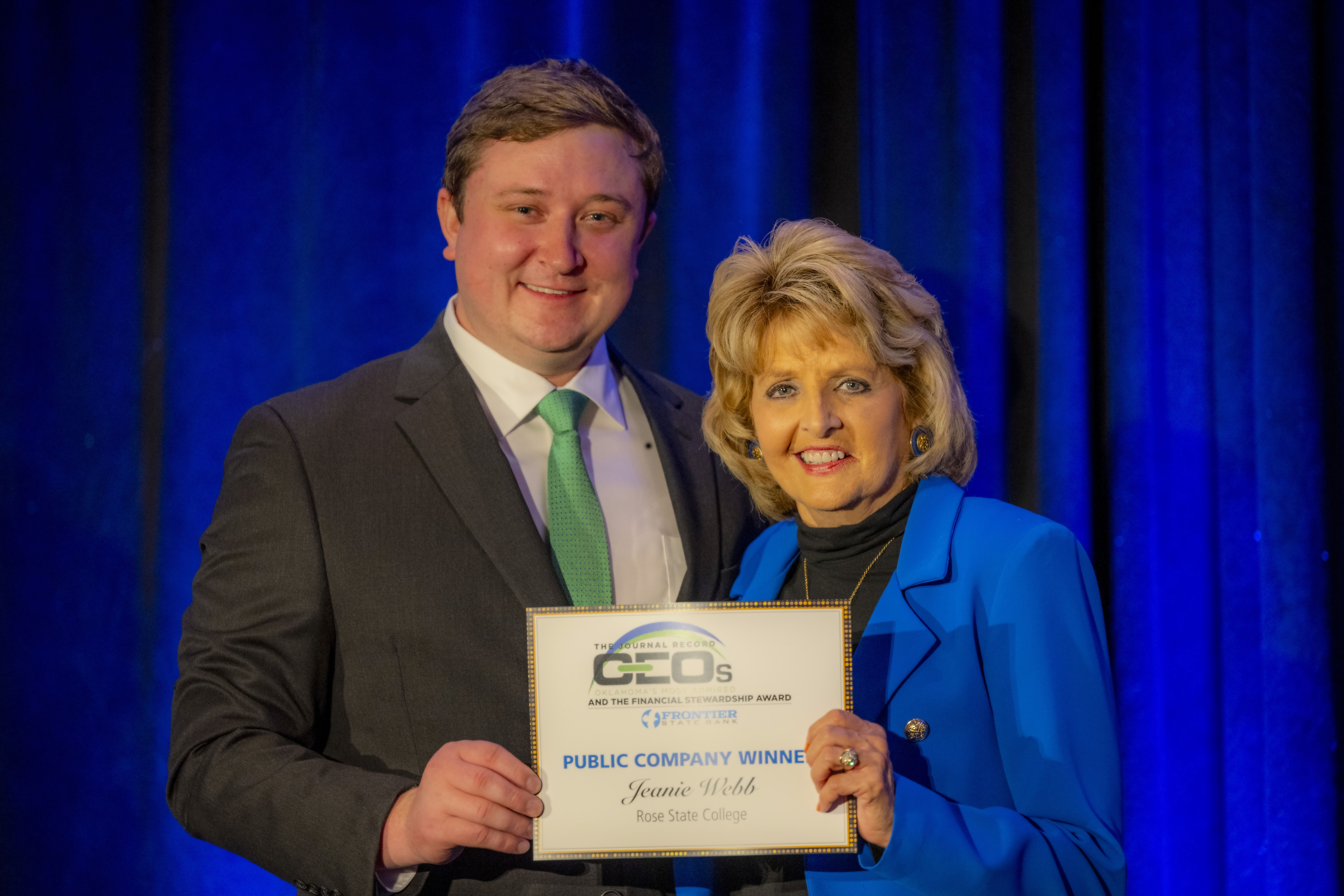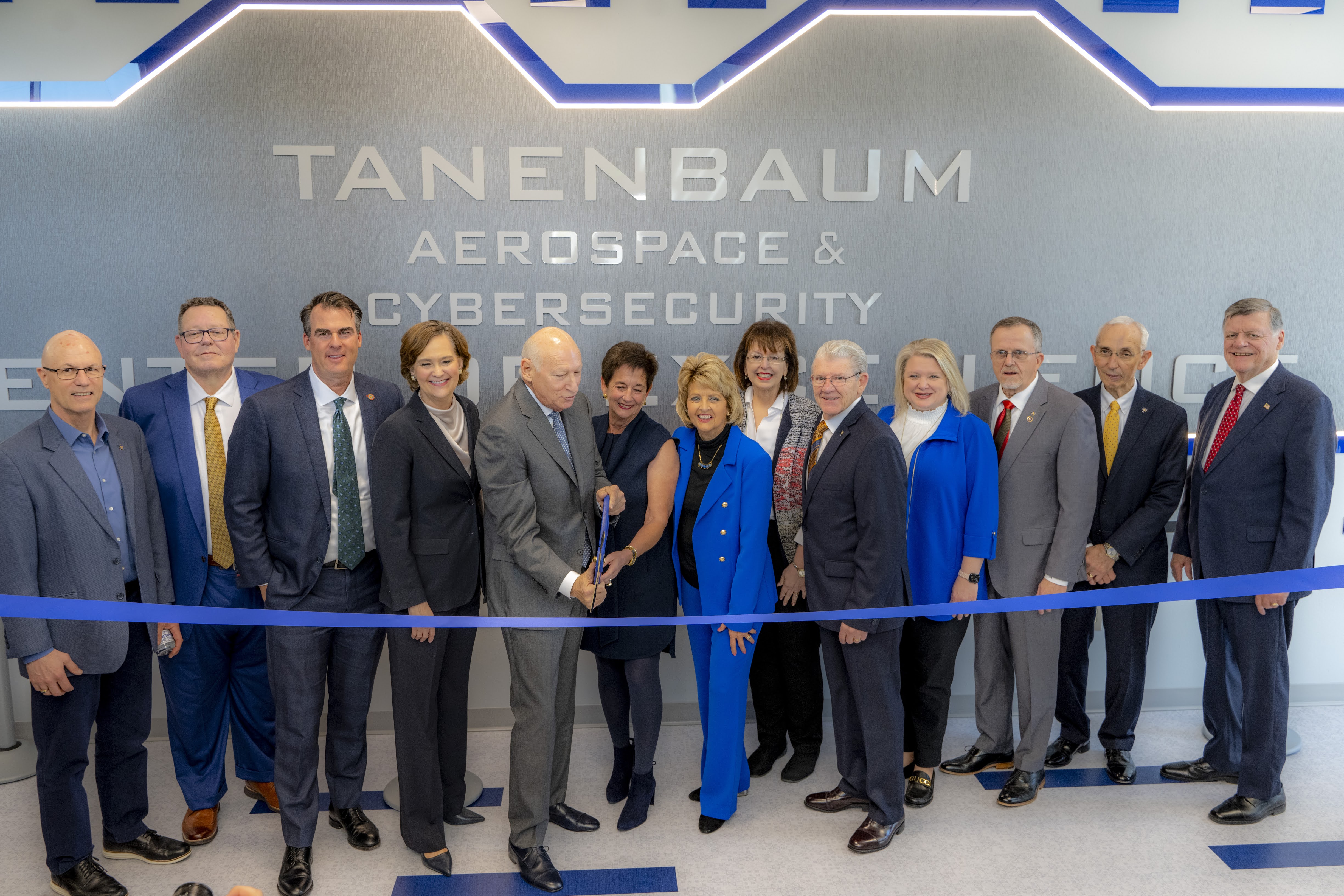McLane, Genevieve
Born: July 20, 1918 at Anadarko, Oklahoma
Date Interviewed: 4/13/03
Interviewer: Hank H. Hester
Topic: Work Experience During World War II
Q: Where did you attend school and for how long?
A: I went to Gatewood Elementary, and then I went to Harding Junior High one year, and I went to Taft two years – it was new then, and I from Taft I went to Classen High School and finished twelfth grade there, and that’s as high as I got in school.
Q: What were your interests and hobbies as a young woman?
A: My interests were cooking and boys and marriage.
Q: When you begin to get a sense that the United States was headed toward war?
A: I’d heard my dad talk to some people, and then we’d been hearing this in the paper. We’d been talking amongst ourselves. We just knew that they were talking about war. So when it came, it was really, not a shock, but it was a surprise because the Japanese did it – they snuck in on us.
Q: What was your reaction?
A: I was scared. I just became engaged to my husband-to-be, and I was afraid that he was going to have to go serve in the war, and he did, and I was afraid it was going to cause our marriage to be put off a little longer, so, that was my thing about the war.
Q: What was the atmosphere like and the mood of the people in which you lived?
A: I was living in Oklahoma City, then. The ones that I ran around with and everyone I came in contact with was really ready for the war, because after the Japs bombed Pearl Harbor we were ready for it. We wanted to get even with them. It was awful, that bombing of Pearl Harbor. I couldn’t believe it. I was over at my girlfriend’s that afternoon, over on Walnut Avenue, and that Roosevelt came in on the radio, and, my gosh, I couldn’t believe it. That they were in Washington with their talks, you know, and while they were there, the Japanese bombed Pearl Harbor. The worst thing that ever happened.
Q: Were you married at the time or seeing anyone?
A: I had just met my husband on November 11, ’41, and that’s what I was worried about. He came back from California to visit his aunt. She lived across the fence from me. And I had never met him before, but his aunt and I went to the grocery store, and I helped her carry the groceries in, or I thought I was going in. But I opened the door and somebody from within opened it, and I fell at his feet with all the groceries! Love at first sight! (laughter)
Q: Did the two of you discuss how the war might affect your relationship?
A: Yea, he said that he was going to have to go on into the war. He thought he could get in there and get it over with fast, you know, but it turned out to be years. But he came down from Madison, Wisconsin. He was here on a 10-day leave and we got married. That was much later.
Q: When did the government announce that women were going to be brought into the defense industry?
A: They didn’t even announce that women were going to be brought in, they just said there was going to be some job openings and I needed a job. I was working at Kress downtown. The Depression wasn’t over good then, and I applied for the job and I took a test and I passed it. But this was taking months, you know. I went to take my physical in May, and I was called up in November of ’42.
Q: What was your reaction at the time you got your job?
A: I was glad I was working, but I was kind of afraid that I couldn’t do the work, because it looked hard.
Q: It was kind of uncharted territory, huh?
A: Yes. I was happy to help out in the war effort. Everybody was willing to do their share. November 2, 1942, I was called up to go to work.
Q: When did you decide to become a so-called “Rosie the Riveter?”
A: Well, we didn’t have anything to do with being “Rosie the Riveter.” They were trying to get a crew together and we came out of Chicago they just put us where they wanted us, or where they needed us. And we just fell in place wherever they needed us. Some of them were in electrical, some of them were in mechanical, some of them were in bearings, and some of them were in different shops, you know. I just landed there. It was November 2, 1942, I went to work at the armory – Oklahoma City Armory. They had all those planes in there and we had B-17s, 24s, 25s, and just those old planes in there. And they taught us how to rivet and buck – we had to buck for ourselves. I was strong in those days and I could do it. I remember I closed my eyes the first time I drilled a hole. I was scared of that stuff! But I made it alright.
Q: How did people close to you react to your decision to do that kind of work?
A: Well, one of Bob’s cousins said “you don’t want to work out at that old nasty place, do you?” And I said “well, they need help and I need a job. I don’t see anything nasty about it. You’re just what your going to be anyway.”
Q: Did you know a lot of other women in your area that were also going to become involved in defense industry?
A: No, I didn’t know anybody that was going to, but then I met a lot of people that were my life-long friends out there. Yea, they were good people. They were shocked that they were out there, too. There wasn’t anybody but 4-Fs – people who couldn’t qualify for the Army – that’s all there was. They needed us.
Q: How did the process unfold as you went from being civilians to a defense industry worker?
A: Well, they were real strict with us. We couldn’t wear our badge on the outside of the field at all. We had to take it off just as soon as we passed the gate. We had to take it off, put it in our purse, and now I see them wearing them on their arms, everywhere, and we just weren’t allowed to do that at all. We didn’t get to leave the field or nothing.
Q: What kind of job or jobs did you work and what were your responsible for?
A: The kind of jobs that I worked was men’s work. I had a big old altimeters, compasses – I started out on compasses – altimeters, and barometers, gun sights, B-52 vertical bomb sight – 2000 lb. Bomb sights – and I’d get them on a big old hoist and I’d lay them down there and then take them apart. I worked on the top part of it, the telescope part. I had to fix all that and they’d send them in there for defrosting. They’d got up 6,000 feet and they’d frosted over, so they wanted the defrosting units put on. So I wired them and put the defrosting units on all of them.
Q: What kind of pay did you receive?
A: You received good pay. Good for the time, you know, salaries were so low. I was only making $16.00 a week at Kress’ and we got $1001.00 when we went to school and then by the time we was there three months we went to $1200.00 and then to $1800.00, and then I was W-16 before I left that field.
Q: That was $1800 per year?
A: Oh, no, that was more than that, you see, $1800 was good for that time, but I was making more than that.
Q: How long did your employment last?
A: Well, it lasted 27-1/2 years. I did a good job.
Q: Did you actually become enlisted into . . .
A: No, I didn’t go into the air force. I had a chance to, as a lieutenant, but I didn’t want to. My brothers didn’t want me in there.
Q: So you worked as a civilian for 27 years?
A: Yes, I didn’t have any Social Security. I worked for the government all that time, and then I retired. And when I retired, my boss didn’t want me to retire. I said “well, I can’t make it anymore. Medically, I’m just out of it.”
Q: What was the mood of your fellow female workers?
A: The female workers, a lot of them thought they were too good to do some of the jobs, you know. They had to do, like, filling compasses with kerosene, and you’d put on rubber gloves, and it would run down your arm, and blister your arm, and blister underneath your fingernails. One gal said “I’m not going to fill any more of those instruments.” I said “well, I’m not going to fill them for you. You’ll have to fill yourself if you’re going to work over here.” And she just didn’t want to fill them at all, but I think she had to fill them. She got a pink slip or something. But there was some of them like that, but most of them were just happy to have a job and to do what they could for the boys that was overseas. I had four brothers over there and my husband, so I had a lot to work for.
Q: Was there a sense of camaraderie among the female workers and did you make any life-long friends?
A: I had several friends who were life-long friends. See, when we went to Chicago, I went with five girls from Oklahoma City, and then we met up there in Chicago with five from New York and five from Georgia. So that was 15 every other week they’d send a fresh bunch up there. So were followed by a different class. But we were the first class they sent up there?
Q: Did all the women enjoy the work or did the work prove too difficult for some of the women?
A: Some of them didn’t want to get their hands dirty or to get dirty and all that kind of stuff. But they didn’t last long. But the ones that worked, really worked. We worked good.
Q: Were the women from every kind of economic, ethnic, racial, social background?
A: Well, yes, I can say that, but up until 1960 when that law came in that blacks could work with us, why they wouldn’t allow them with us. See, when I went to Chicago, New York sent a black girl over there to work with us. Well, I didn’t have anything about it, I would work with her, but that captain sent her back. He was a southern captain, over us, and he sent her back and said to send somebody else back. You know, she got in the shower and burned herself all up, so he sent back home. This little black girl, I felt sorry for her. But anyway, I worked with the first black guy that come in there. 1960-something. His name was Merle Bradley. He’s dead now. He’d say, “Miss Ginny, what are we going to do next?” (laughter) I didn’t mind it.
Q: Could you elaborate on whether or not all women were treated equally or if some women because of their background had a more difficult time than others?
A: I couldn’t see any difference in anybody after they got in there. They treated us all the same as far as I was concerned.
Q: All the white women working?
A: All the white and the black and everything, after Johnson signed that law. . .
Q: But beginning back in the 40s?
A: Well, in the 40s they didn’t get to come in there. They worked as janitors and cleaned the restrooms and things like that.
Q: What was the reaction of your fellow male workers?
A: Well, the men, they made me prove myself all the time. I worked on a line with them. On bomb sights, I was the only woman there for awhile. Everything that they had to do, I had to do. Like if they had to empty the garbage, I had to empty it. And I had to take my turn on that floor polisher, too. I had to prove myself all over again hundreds of times out there, every time I’d go into a different unit. You know, we’d run out of work in our unit and they’d pass us on to somebody else, and then we’d go back to our unit when they got work in, but we were passed all over the field that way. I worked in that bunny suit in the clean room, I worked in bearings over in Douglas’ old area. They took it over, you know, after Douglas left, because my sister worked there in Douglas. And she’d crawl around on those planes and put those little lights and things in there. She was small and could get through the plane.
Q: How were you treated by the men as well as the bosses who were in charge?
A: Well, after I proved myself, the men were alright with me. They always helped me, and then you’d get these old hard screws that I couldn’t get out. I’d work and work, and they’d see me and come over there a help me, but I never asked for any help, they’d just come a help me. And they were good to me.
Q: Did you ever actually work out at Tinker Air Force Base?
A: Yes.
Q: I thought you said you were at the Armory in Oklahoma City?
A: Well, I started out there. I did a month, and then I went to Chicago for four months and I came back to the field and they still didn’t have any sidewalks. They had boards we had to walk on.
Q: What was the overall atmosphere at Tinker Air Force Base and the surrounding area?
A: Well, they were wanting us to get their work out and meet all our schedules. That’s what they held for – schedules, schedules, schedules! And we did. We worked like dogs. I’d work 10 – 12 hours a day and sometimes I didn’t want to work, but I’d work anyway. I worked out there during World War II and the Korean and the Vietnam War. My son was in Vietnam.
Q: What kinds of memorable occurrences did you witness or experience?
A: We had those big bond rallies and we’d go over there and you’d get to see those planes that bombed Japan. We’d go in there and see all those planes that was in the war that had pictures of women on them and everything. We had to go there at night after we got off in the evening – over in the big hanger and see all those planes. And we’d buy bonds, again, or increase our bonds – of course, it was to help the boys.
Q: After the war, was there any kind of pressure from the government and the media for women to leave the workplace and return to the home so that the veterans could once again have access to jobs?
A: No. There weren’t veterans crying for those jobs. Some of them came back and they went to work there, and they always reminded us that they were veterans and they had seniority, because their service counted. But I never argued with them. I just knew there was plenty of work for all of us, so I just went ahead and worked. And when we’d run out in our department, they’d ship us to another one. We just found out that we could do the work, and we could.
Q: When the war was over did you quite working?
A: No, I worked for 27-1/2 years.
Q: How do you think the war years impacted the lives of women in this country?
A: Well, it gave them confidence and they knew they that they could do anything – any kind of a job – when they got out of there, I’ll tell you.
Q: What impact did the working women of World War II and their experiences have on future generations of American women?
A: There’s a bunch out there now working. The field got women out there. So they’ll always have them. They’ll do a good job wherever they go. They found out they can do it, and they’re going to do it.
Q: Did the skills you learned during the war serve you in any kind of way in the subsequent years afterward?
A: Yea, I can do things around this house. I took care of a lot of things that was out of order and I learned all that stuff. How to fix things. The kids really liked to see me fix things daddy couldn’t fix! (laughter)
Q: What things stand out most in regard to your experience as a “Rosie the Riveter” or any other kind of work you did during World War II?
A: I knew when I first went out there that I was scared. I was afraid I couldn’t do the job. And I thought “well, you’ve got to do that, girl.” I talked to myself, “you’ve got to have a job and you’ve got to do a good job. You’ve got to get this done good.” They wanted quality work. It taught me to be on time always. I always did the best job I could do. We were loyal. We’d think “did I fly with that airplane? Put this instrument in there?” Quality work was the only thing. In fact, I won a $200 cash award for a superior rating in my work.
Q: What kind of lessons did you learn?
A: I learned that I could do anything that anybody else could do.
Q: Would you like to expand on anything else?
A: These are my award things here that I got for not having any defects in my work or my instruments. I got these = zero defects award. They’d give us these every six months, and I got them. Then I got service pins. I got this Women’s Aircraft Instrument Technician that I wore on my uniform.



